In this new Just FACT blog series ‘Food Justice – reshaping the narrative around food insecurity‘ – Hussina Raja, Just FACT Mobiliser speaks with people working in cafes across Walthamstow, Hackney and Tower Hamlets to learn more about the food scene and hospitality sector as well as finding out how accessible these spaces are to the local community.
In August 2023, Hussina caught up with Matt and Lizzie, two chefs who run Curry Club, which was originally set up in Holloway during lockdown in 2021 from a desire to create an inclusive community space that was accessible for everyone to enjoy a delicious meal. Curry Club operates as a dining-experience on a pay-what-you-feel basis. The ethos behind such a model is offering people good quality food and benefitting from a hot meal even if you can’t afford it, with its core values rooted in eating with dignity and respect.
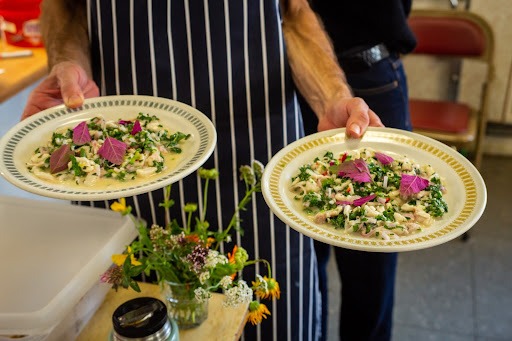
Photo credit: Felix Schmilinsk
A pop up restaurant with a difference
Curry Club is now situated at the Hackney Chinese Community Centre. Dressed as a pop-up restaurant with banquet style tables scattered around the space and a maître d’ welcoming guests.
I took a seat alongside two Lawyers from North London who found out about Curry Club through some friends who’d been to the last pop-up. A jovial older couple to my left are having a whale of a time, taking photos of themselves enjoying their meal. I overhear them saying it’s nice to try something new, it’s different. It’s a real blend of communities, a mix of referrals from Hackney Council – mostly elderly groups who sit alongside younger demographics made up of professionals, families and friends.
Dining-experience on a pay-what-you-feel basis
A cash tub sits discreetly in the corner of the room. Money really isn’t the priority for Matt and Lizzie, but it is needed to sustain their pop-up restaurant. They crowdfunded £10k to buy ingredients and get it up and running.
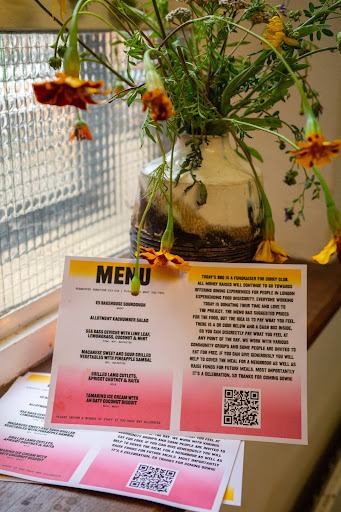
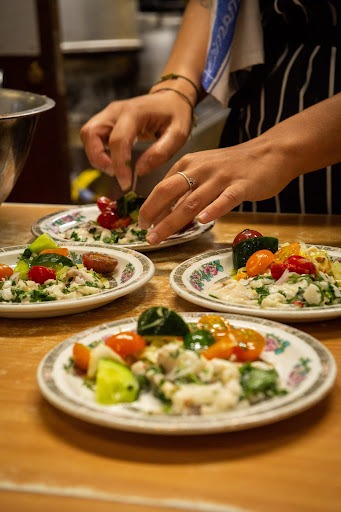
The meal and experience are provided on a donation-basis. A QR code on the menu allows visitors to pay in their own time, so that the transaction is not enforced. Those who can afford to pay for a restaurant-style meal at a fraction of the price have the option to pay more. A suggested donation (£12-£15) covers the cost of a meal for someone who wouldn’t normally be able to enjoy such an experience.
Good food with a humble price tag
My three-course meal consisted of a starter of sourdough bread with an allotment grown kachumber salad and sea bass ceviche with lime leaf, lemongrass, coconut and mint. The veggie-main was Macanese sweet and sour grilled vegetables with pineapple sambal, while the meat option on offer was barbecued lamb cutlets with apricot chutney and raita. To finish it off, dessert was a tamarind ice cream with an oaty coconut biscuit. Sound fancy? It was, but with a down-to-earth interior and a humble price tag.
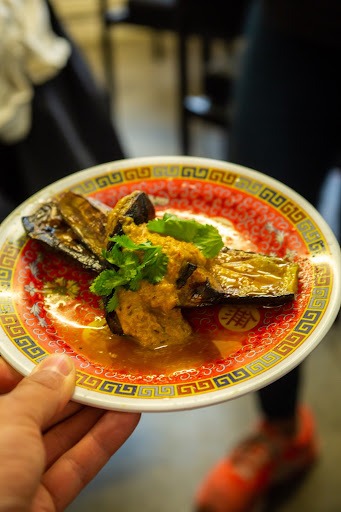
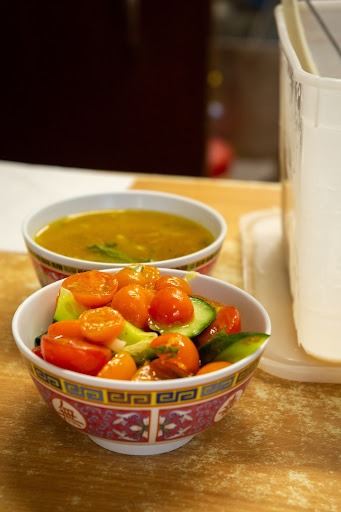
How accessible is eating out?
The cost of going out for a nice meal in a restaurant in London feels like a real luxury for a lot of people – even those with a regular, stable income. I’ve noticed in recent years how a vegetarian meal costs the same as a main dish with meat. I guess, as there is a rise in more veggie/vegan eating, the onus falls on the customer for restaurants to be able to generate a profit.
Is it reasonable for a basic meal to cost those on the lowest incomes more than what they earn in an hour?
Let’s also not forget the discretionary 12.5% service charge that has become synonymous with the dining experience and doesn’t always include the tip. A basic meal can easily set you back £15/£20, which is higher than the hourly London-Living-wage allowance, currently sitting at £10.42, even lower outside of London. Is it reasonable for a basic meal to cost those on the lowest incomes more than what they earn in an hour? If so, how does the social dining experience remain fair and equally accessible for everyone? Or alternatively, what proportion of a person’s income is a reasonable percentage for a meal? That’s a nuanced debate to get into but alludes to the reality that the dining experience is only possible for a proportion of people within a certain wealth bracket.
After enjoying my delicious meal, I caught up with Matt and Lizzie to ask them some questions:
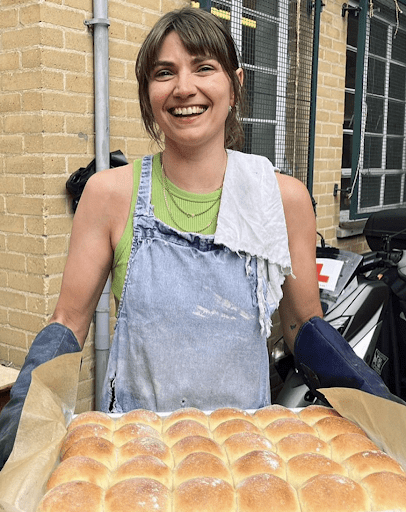
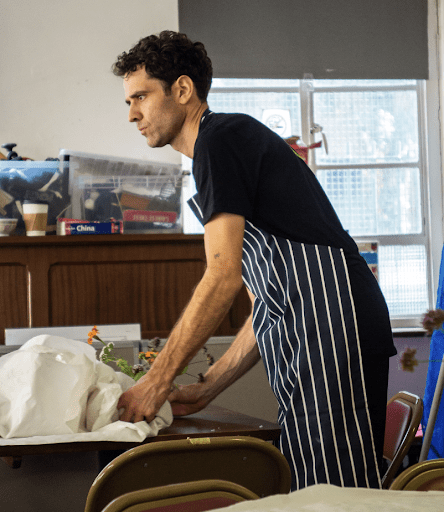
So, what led Matt and Lizzie to want to recreate a community
They’re both clearly passionate about food and believe that everyone should be able to enjoy it in a joyful manner. They used to run a restaurant called Railroad in Homerton, a popular hotspot on Morning Lane known for its food and open-mic nights; they closed it in 2015. It sounds like their seasonal, produce-led approach to cooking was ahead of its time. They admit that they had tried to do a lot with the place but look back fondly, having learnt a lot from running a restaurant as young, idealistic chefs in their early 20s. Disillusioned by the London restaurant scene and overlooked by food trends, they decided that if they were to do it again, it would be for the community.
Fast forward several years and the pandemic really brought to light the immediate disparity people were facing when it came to food. Some people had more disposable income and were able to order takeaways from restaurants, while others were going hungry, barely being able to feed themselves and relying on food banks. A poignant moment was when public sports figure, Marcus Rashford, used his platform to persuade Boris Johnson’s government to make a U-turn on scrapping free school meals over Covid-19, recognising that families wouldn’t be able to feed their children without that support. He himself had first-hand experience of what free school meals meant to him and low-income families.
Matt had wanted to cook for people and was searching for an opportunity. It came about in the shape of Elizabeth House in Islington, who were looking for a cook to distribute 40/50 weekly food parcels using surplus food. Through his contacts Matt brought together furloughed chefs to cook on a rota basis, giving them free will to cook what they would have if their restaurants were open and incentivising it as a fun and enjoyable experience for them. They promoted it as restaurant-quality food cooked with care and attention sent out as food parcels.
Curry Club then came into fruition and for the first four months they provided 100 to 200 meals a week. The name Curry Club came about because that’s the food they wanted to cook. They thought a lot about how people, based on their class, eat in very different ways in this country, but curry cuts through class, it’s a unifying dish. ‘Go to any curry house and you’ll see people from all walks of life. It’s a melding of cultures. It’s global while also being very British’.
They were conscious of being seen as white people culturally appropriating this claim to a food that transcends across many different cultures. Taking inspiration from the Sikh practice of seva, which refers to acts of selfless service by feeding people in community kitchens known as langar in Gurdwara temples, they decided it was a celebration of joyful cooking and nourishing one another so they kept the name.
How did the pay-what-you-feel model come about?
Matt and Lizzie had both volunteered in places that inspired them to adopt a model that was based on what people could afford, and an ethos of eating together communally. Matt went back to his native Australia and worked in a restaurant run by a Sri Lankan man in Melbourne. He reflects on the vegan buffet style set-up and a $10 suggested donation. Seeing how well it worked gave him the motivation to do it himself.
Lizzie, on the other hand, worked in an anarchist cafe in Paris called La Cantine des Pyrénées, which she describes as incredible, and inspired a lot of her thinking. The most joyful eating space which offered a 3-course sit-down meal with a coffee for €4! The emphasis is on everyone eating the same, including the volunteers because that is what it means to eat together without any hierarchies or conditions.
Is this model sustainable?
So far, they’ve not received any external funding. Half of the crowdfunded money was spent on ingredients and the other half is what’s keeping them going. They worked with Nourished Communities in Islington who provided free produce in their first few weeks of operation.
The support from suppliers is where they envision their model being able to thrive, building partnerships is something that will bring in a wider audience and more publicity. Suppliers allow them to also get the best prices on produce and bring their overheads down. That would make it affordable.
Generous donations are a huge help too, as are those who volunteer. Their volunteering system allows people to decide how they want to be compensated for their time by identifying their own needs – who can help, who needs to be paid? It’s a new way of interacting behind the scenes, teaching people skills; how to wait tables, provide service, how to be warm and hospitable, food knowledge and love. Through a process of exchanging skills, cooking together, having fun and being part of something that is communal and positive makes financial compensation secondary.
WHO IS WILLING TO GET ONBOARD WITH THIS EXPERIMENT AND THIS NEW WAVE OF EATING?
Currently all the money made from the meals goes back into Curry Club. They’d love to turn it into a social enterprise and eventually pay themselves, so watch this space.
I’m glad to have experienced Curry Club’s pop-up BBQ this month despite the rain! It really is a great way for people from all walks of life to come together and interact with one another in a busy city that doesn’t always allow for casual leisurely interactions.
The opportunity to break bread is one that is more than just eating but finding time and space to commune, rest, nourish and reflect. If these spaces become exclusive by way of economics, we’re at risk of losing cultural exchanges and connecting with others outside of our circles. It would be so enriching to see more initiatives like Curry Club, they’re valuable in maintaining a sense of community cohesion.
My concern is how they will and can sustain themselves in the future – so far fundraising, volunteering and support from suppliers allow Curry Club to operate once a month but I’d love to see them popping up more often.
If you happen to fit into any of the areas of support and can offer your services, donations or time get in touch with them directly.
Instagram: @CurryClubLDN
Email: curryclubcommunity@gmail.com
Website: www.curryclubldn.org


Hussina Raja, Just FACT Mobiliser
Hussina is a multidisciplinary artist with a background in social justice. She is passionate about working with local community groups and young people. She especially enjoys bringing people together over food.
As part of her work on the Just FACT programme, Hussina is interested in exploring the role of cafe business models, their social responsibility and their existence as spaces for socialising and gathering, particularly in areas undergoing mass regeneration. How accessible food is in spaces of hospitality, especially for the local community, old residents and new arrivals, is a pertinent issue she wants to understand from the perspective of both the cafe and the consumer.
